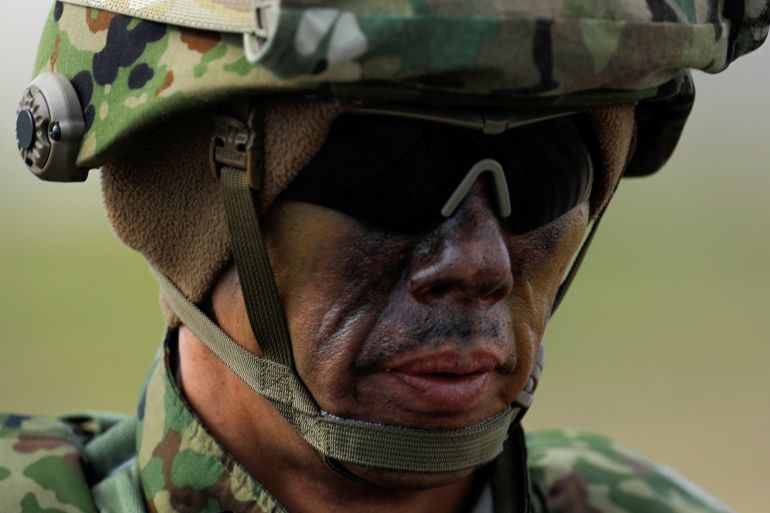US, Japan chide China as they deepen defence ties
Two countries accuse China of ‘ongoing efforts’ to undermine rules-based order amid uncertain regional outlook.

Japan and the United States have expressed concern about what they described as China’s “ongoing efforts” to “undermine” the rules-based international order, as the two countries agreed to deepen defence cooperation in response to new and emerging threats.
US Secretary of State Antony Blinken, Japan’s Foreign Minister Yoshimasa Hayashi, and the two countries’ defence ministers met virtually to discuss stepping up security ties amid a growing focus on Japan’s international role.
Keep reading
list of 4 itemsAustralia, Japan sign ‘historic’ defence pact amid China concerns
North Korea fires suspected ballistic missile: Japan, South Korea
Biden signs enormous US military budget into law
The ministers “expressed their concerns that ongoing efforts by China to undermine the rules-based order present political, economic, military, and technological challenges to the region and the world”, according to a statement released after the meeting.
“They resolved to work together to deter and, if necessary, respond to destabilising activities in the region.”
They also expressed concern about China’s activities in the East China Sea, where Japan is involved in a territorial dispute over the Senkaku Islands, and reiterated their “strong objections” to China’s “unlawful maritime claims, militarization and coercive activities in the South China Sea”.
Beijing claims almost the entire sea under its so-called nine-dash line that was rejected by an international court after a case brought by the Philippines in 2016. It has been building artificial islands and military outposts there, as well as deploying its coast guard and its shadowy maritime militia.
The ministers also said they had “serious and ongoing concerns” about human rights issues in Xinjiang as well as Hong Kong and underscored the importance of peace and stability in the Taiwan Strait.
China’s foreign ministry spokesman Wang Wenbin said on Friday that China deplores the recent comments by the United States and Japan.
China lodged a formal complaint with both countries, said Wang, at a daily news briefing in Beijing.
Ahead of the meeting, Blinken said the US and Japan would sign a new defence collaboration deal designed to counter emerging threats, such as hypersonic and space-based weaponry, in a week when North Korea tested what it said was a hypersonic missile.
Blinken said the US-Japan alliance “must not only strengthen the tools we have, but also develop new ones”, citing Russia’s military build-up against Ukraine, Beijing’s “provocative” actions over Taiwan, and the North Korean missile launch.
Russia, China and the US are also racing to build hypersonic weapons whose extreme speed and manoeuvrability make them hard to spot and block with existing missiles.
“We’re launching a new research and development agreement that will make it easier for our scientists, for our engineers and programme managers to collaborate on emerging defence related issues, from countering hypersonic threats to advancing space based capabilities,” Blinken said at the opening of the meeting.
Hayashi told his US counterparts the international community faces challenges including “unilateral corrosive attempts to change the status quo, abusive use of unfair pressure and the expanding authoritarian regimes”.
The meeting between US and Japanese officials comes a day after Japan signed a security agreement with Australia.
The Reciprocal Access Agreement (RAA) – only the second that Japan has signed with a foreign power – was agreed at a virtual meeting between Japanese Prime Minister Fumio Kishida and Australian Prime Minister Scott Morrison on Thursday.
Morrison called the RAA a “pivotal moment for Australia and Japan” that will “form an important part” of the two countries’ response to “the uncertainty we now face”.
Japan last month approved record defence spending, with a 10th straight annual increase in 2022.
As its neighbours test hypersonic missiles, Japan has been working on electromagnetic “railgun” technology to target those missiles.